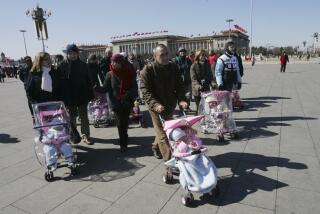Adopting accountability
- Share via
WHERE DO BABIES COME FROM? For people who adopt from overseas, the operating assumption is that children who need a home were abandoned by their birth mothers and somehow delivered to an orphanage. Yet the circumstances of each baby’s background often remain elusive.
China is the biggest source of American adoptions from overseas, not because of its large population but because of the reliability and predictability of its system. In 2005, nearly 8,000 children from China -- 95% of them girls -- were adopted into American families, far more than from any other country. Adoption facilitators who work regularly with Chinese orphanages report that they are generally run by dedicated and conscientious staff.
In recent years, however, the fabric of Chinese society has been strained by unruly economic growth. The spread of markets and money has improved the lives of millions but also weakened central control and undermined some systems that worked well in the past. The lure of easy cash can tempt an official in any position, even one in an orphanage.
An indifferent and corrupt police force has allowed the crime of child abduction to spawn. As Mark Magnier reported last week in The Times, kidnapped children are sometimes forced into begging rings or prostitution; others become live-in servants. Newborns have been sold to orphanages, which have been known to pay $3,000 to the parents when a baby is adopted overseas. There are few more heinous crimes than forcibly separating mother from child.
The buying and selling of children, unfortunately, is not new. Baby trafficking in Vietnam and Cambodia caused a suspension of U.S. adoptions there a few years ago. Now China needs to be watched too. Last November, authorities in Hunan province uncovered a baby-selling scheme run by a trader charging $100 a newborn, and the director and senior staff of a state orphanage in the city of Hengyang were arrested for complicity. In a separate case last year, duffel bags containing 28 baby girls were discovered on a bus, the infants heavily sedated to keep them from crying.
The China Center for Adoption Affairs, the governmental agency that arranges international adoptions, has refused to answer inquiries about the case from U.S. groups that facilitate adoption. With silence, the Chinese only make the issue loom larger. At the same time, U.S. agencies have a moral obligation to press China for more information, or we may never know how widespread the problems are.
China’s leaders yearn to become full members of the world community, and they are investing billions in the Beijing 2008 Olympics to help secure their reputation. More openness about the Hunan case and its ramifications is necessary to restore confidence in a system that, to now, has worked well.
More to Read
Sign up for Essential California
The most important California stories and recommendations in your inbox every morning.
You may occasionally receive promotional content from the Los Angeles Times.













